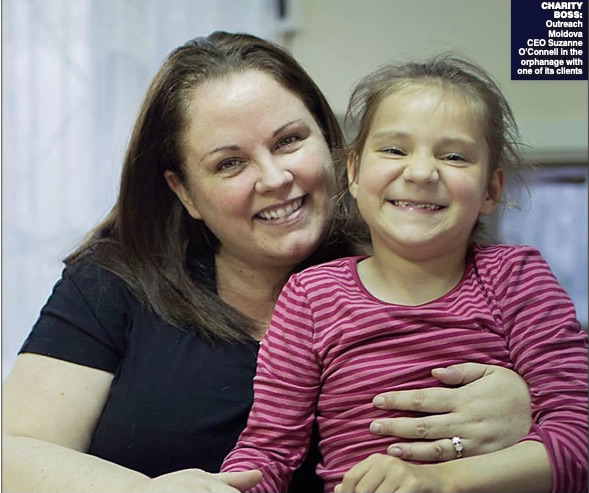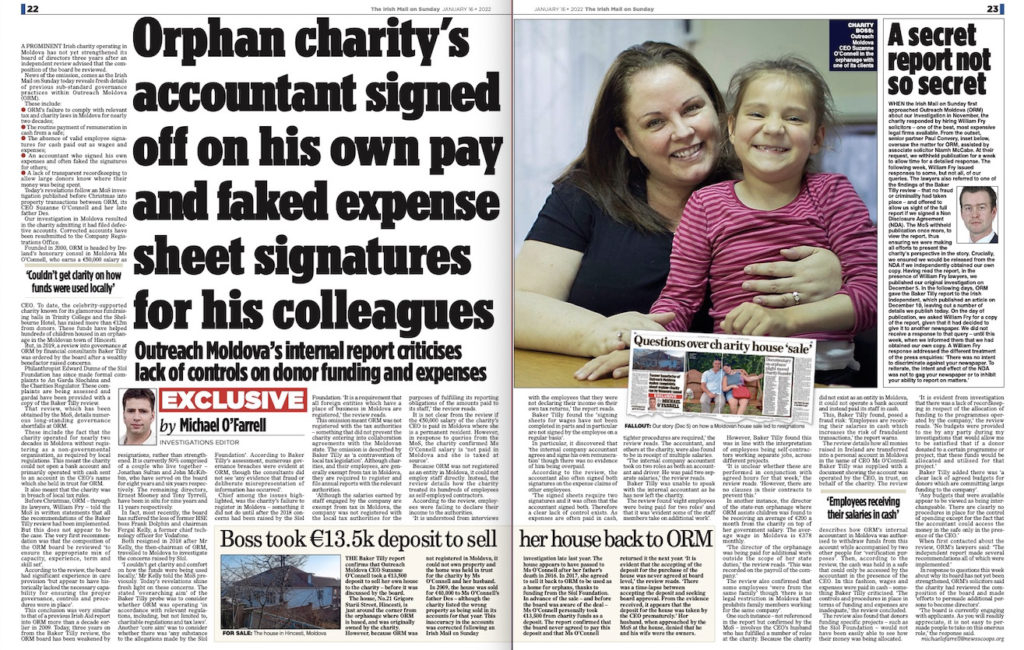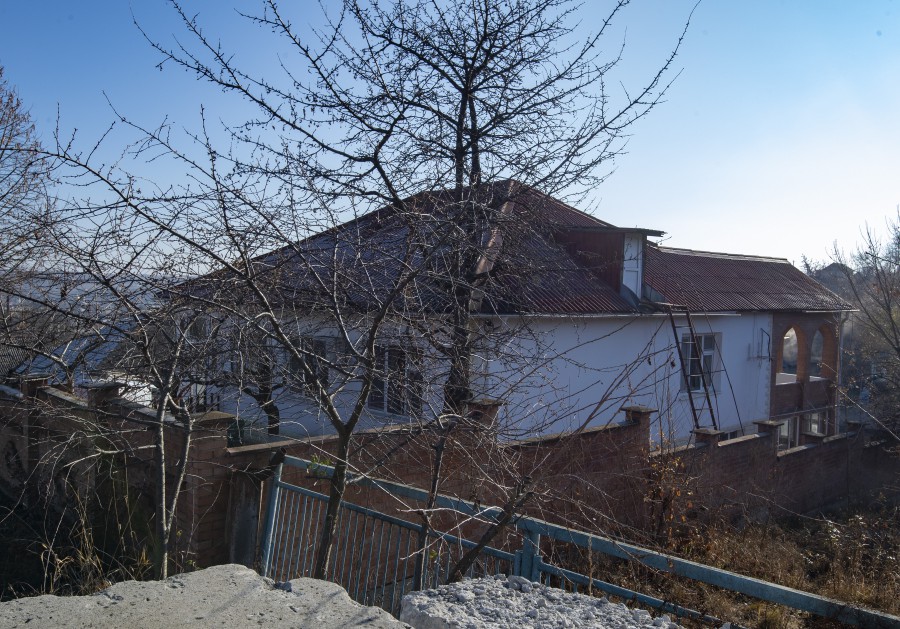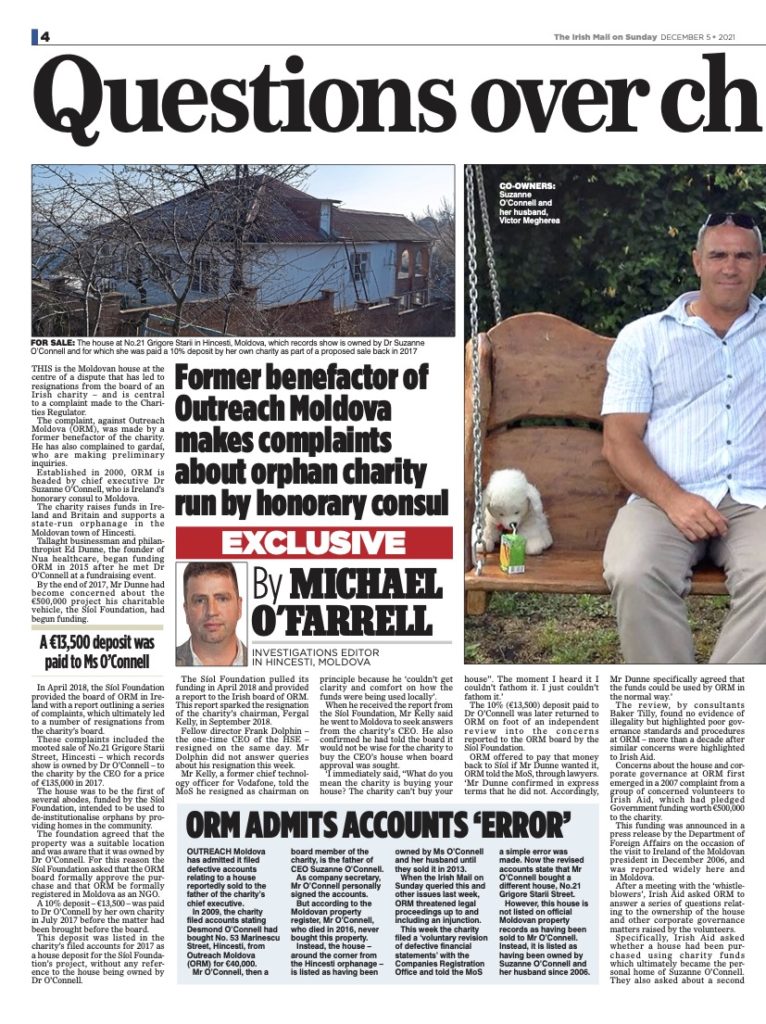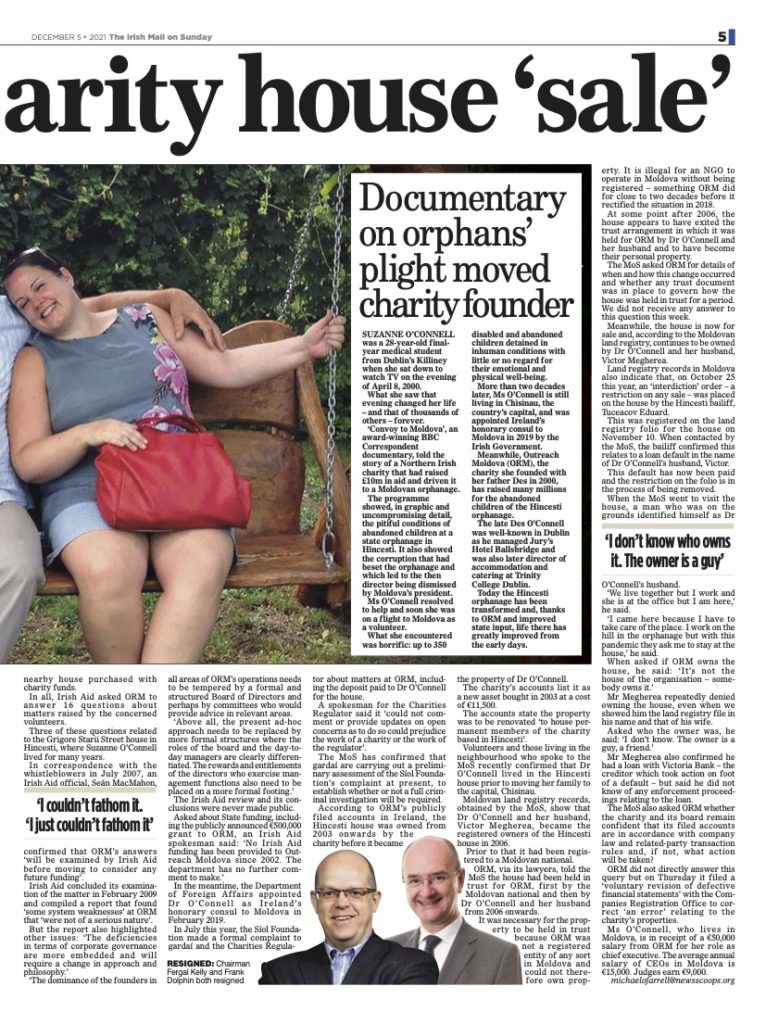A PROMINENT Irish charity operating in Moldova has not yet strengthened its board of directors three years after an independent review advised that the composition of the board be reviewed.
News of the omission, comes as the Irish Mail on Sunday today reveals fresh details of previous sub-standard governance practices within Outreach Moldova (ORM).
These include:
- ORM’s failure to comply with relevant tax and charity laws in Moldova for nearly two decades;
- The routine payment of remuneration in cash from a safe;
- The absence of valid employee signatures for cash paid out as wages and expenses;
- An accountant who signed his own expenses and often faked the signatures for others;
- A lack of transparent recordkeeping to allow large donors know where their money was being spent.
Today’s revelations follow an MoS investigation published before Christmas into property transactions between ORM, its CEO Suzanne O’Connell and her late father Des.
Our investigation in Moldova resulted in the charity admitting it had filed defective accounts. Corrected accounts have been resubmitted to the Company Registrations Office.
Founded in 2000, ORM is headed by Ireland’s honorary consul in Moldova Ms O’Connell, who earns a €50,000 salary as CEO.
To date, the celebrity-supported charity known for its glamorous fundraising balls in Trinity College and the Shelbourne Hotel, has raised more than €12m from donors. These funds have helped hundreds of children housed in an orphanage in the Moldovan town of Hincesti.
But, in 2019, a review into governance at ORM by financial consultants Baker Tilly was ordered by the board after a wealthy benefactor raised concerns.
Philanthropist Edward Dunne of the Síol Foundation has since made formal comresignations, plaints to An Garda Síochána and the Charities Regulator. These complaints are being assessed and gardaí have been provided with a copy of the Baker Tilly review.
That review, which has been obtained by the MoS, details numerous long-standing governance shortfalls at ORM.
These include the fact that the charity operated for nearly two decades in Moldova without registering as a non-governmental organisation, as required by local regulations. This meant the charity could not open a bank account and primarily operated with cash sent to an account in the CEO’s name which she held in trust for ORM.
It also meant that the charity was in breach of local tax rules.
Before Christmas, ORM – through its lawyers, William Fry – told the MoS in written statements that all the recommendations of the Baker Tilly review had been implemented.
But this does not appear to be the case.
The very first recommendation was that the composition of the ORM board be reviewed ‘to ensure the appropriate mix of capacity, experience, term and skill set’.
According to the review, the board had significant experience in care provision ‘but appear to have historically lacked the necessary capability for ensuring the proper governance, controls and procedures were in place’.
This conclusion was very similar to that of a previous Irish Aid report into ORM more than a decade earlier in 2009.
Today, three years on from the Baker Tilly review, the ORM board has been weakened by rather than strengthened.
It is currently 50% comprised of a couple who live together – Jonathan Sultan and John McKibbin, who have served on the board for eight years and six years respectively. The remaining directors, Ernest Mooney and Tony Tyrrell, have been in situ for nine years and 11 years respectively.
In fact, most recently, the board has suffered the loss of former HSE boss Frank Dolphin and chairman Fergal Kelly, a former chief technology officer for Vodafone.
Both resigned in 2018 after Mr Kelly, the then-chairman of ORM, travelled to Moldova to investigate the concerns raised by Síol.
‘I couldn’t get clarity and comfort on how the funds were being used locally,’ Mr Kelly told the MoS previously.
Today’s revelations shine fresh light on these concerns.
The stated ‘overarching aim’ of the Baker Tilly probe was to consider whether ORM was operating ‘in accordance with relevant regulations, including, but not limited to, charitable regulations and tax laws’.
Another ‘core aim’ was to consider whether there was ‘any substance to the allegations made by the Síol Foundation’.
According to Baker Tilly’s assessment, numerous governance breaches were evident at ORM, though the consultants did not see ‘any evidence that fraud or deliberate misrepresentation of information has occurred’.
Chief among the issues highlighted, was the charity’s failure to register in Moldova – something it did not do until after the 2018 concerns had been raised by the Síol Foundation.
‘It is a requirement that all foreign entities which have a place of business in Moldova are registered,’ the review reads.
This omission meant ORM was not registered with the tax authorities – something that did not prevent the charity entering into collaboration agreements with the Moldovan state.
The omission is described by Baker Tilly as ‘a contravention of local tax legislation’.
Although charities, and their employees, are generally exempt from tax in Moldova, they are required to register and file annual reports with the relevant authorities.
‘Although the salaries earned by staff engaged by the company are exempt from tax in Moldova, the company was not registered with the local tax authorities for the purposes of fulfilling its reporting obligations of the amounts paid to its staff,’ the review reads.
It is not clear from the review if the €50,000 salary of the charity’s CEO is paid in Moldova where she is a permanent resident. However, in response to queries from the MoS, the charity confirmed Ms O’Connell salary is ‘not paid in Moldova and she is taxed at source’.
Because ORM was not registered as an entity in Moldova, it could not employ staff directly. Instead, the review details how the charity treated its hundreds of employees as self-employed contractors.
According to the review, employees were failing to declare their income to the authorities.
‘It is understood from interviews with the employees that they were not declaring their income on their own tax returns,’ the report reads.
Baker Tilly found the ‘signing sheets for wages have not been completed in parts and in particular are not signed by the employee on a regular basis’.
In particular, it discovered that ‘the internal company accountant agrees and signs his own remuneration’ though there was no evidence of him being overpaid.
According to the review, the accountant also often signed both signatures on the expense claims of other employees.
‘The signed sheets require two signatures and it was often that the accountant signed both. Therefore a clear lack of control exists. As expenses are often paid in cash, tighter procedures are required,’ the review reads.
The accountant, and others at the charity, were also found to be in receipt of multiple salaries.
‘The internal company accountant took on two roles as both an accountant and driver. He was paid two separate salaries,’ the review reads.
Baker Tilly was unable to speak with the internal accountant as he has now left the charity.
The review found ‘eight employees were being paid for two roles’ and that it was ‘evident some of the staff members take on additional work’.
However, Baker Tilly found this was in line with the interpretation of employees being self-contractors working separate jobs, across different projects.
‘It is unclear whether these are performed in conjunction with agreed hours for that week,’ the review reads. ‘However, there are no clauses in their contracts to prevent this.’
In another instance, the director of the state-run orphanage where ORM assists children was found to be receiving an average of €200 a month from the charity on top of her government salary. The average wage in Moldova is €378 monthly.
‘The director of the orphanage was being paid for additional work outside the scope of her state duties,’ the review reads. ‘This was recorded on the payroll of the company.’
The review also confirmed that some employees ‘were from the same family’ though ‘there is no legal restriction in Moldova that prohibits family members working for the same company’.
One such instance – not referenced in the report but confirmed by the MoS – involves the CEO’s husband who has fulfilled a number of roles at the charity.
Because the charity did not exist as an entity in Moldova, it could not operate a bank account and instead paid its staff in cash.
This, Baker Tilly found, posed a fraud risk: ‘Employees are receiving their salaries in cash which increases the risk of fraudulent transactions,’ the report warns.
The review details how all monies raised in Ireland are transferred into a personal account in Moldova in the name of CEO Ms O’Connell. Baker Tilly was supplied with a document showing the account was operated by the CEO, in trust, on behalf of the charity.
The review describes how ORM’s internal accountant in Moldova was authorised to withdraw funds from this account while accompanied by two other people for ‘verification purposes’.
Then, according to the review, the cash was held in a safe that could only be accessed by the accountant in the presence of the CEO.
In this fashion, wages and expenses were paid in cash – something Baker Tilly criticised. ‘The controls and procedures in place in terms of funding and expenses are inadequate,’ the review concluded.
The review also found that donors funding specific projects – such as the Síol Foundation – would not have been easily able to see how their money was being allocated.
‘It is evident from investigation that there was a lack of recordkeeping in respect of the allocation of funding to the programmes operated by the company,’ the review reads.
‘No budgets were provided to me by any party during my investigations that would allow me to be satisfied that if a donor donated to a certain programme or project, that these funds would be allocated and utilised for that project.’
Baker Tilly added there was ‘a clear lack of agreed budgets for donors which are committing large funding to the company’.
‘Any budgets that were available appear to be viewed as being interchangeable. There are clearly no procedures in place for the control of spending except for the fact that the accountant could access the money in the safe only in the presence of the CEO.’
When first contacted about the review, ORM’s lawyers said: ‘The independent report made several recommendations all of which were implemented.’
In response to questions this week about why its board has not yet been strengthened, ORM’s solicitors said the charity had reviewed the composition of the board and made ‘efforts to persuade additional persons to become directors’.
‘The board is currently engaging with applicants. As you will readily appreciate, it is not easy to persuade people to take on this onerous role,’ the response said.
Boss took €13.5k deposit to sell her house back to ORM
THE Baker Tilly report confirms that Outreach Moldova CEO Suzanne O’Connell took a €13,500 deposit to sell her own house to the charity – before it was discussed by the board.
The house, No.21 Grigore Starii Street, Hincesti, is just around the corner from the orphanage where ORM is based, and was originally owned by the charity.
However, because ORM was not registered in Moldova, it could not own property and the home was held in trust for the charity by Ms O’Connell and her husband.
In 2009, the house was sold for €40,000 to Ms O’Connell’s father Des – although the charity listed the wrong property as being sold in its accounts for that year. This inaccuracy in the accounts was corrected following an Irish Mail on Sunday investigation late last year.
The house appears to have passed to Ms O’Connell after her father’s death in 2016. In 2017, she agreed to sell it back to ORM to be used as a home for orphans, thanks to funding from the Síol Foundation.
In advance of the sale – and before the board was aware of the deal – Ms O’Connell personally took €13,500 from charity funds as a deposit.
The report confirmed that the board never agreed to pay this deposit and that Ms O’Connell returned it the next year.
‘It is evident that the accepting of the deposit for the purchase of the house was never agreed at board level,’ the review reads.
‘There was a time-lapse between accepting the deposit and seeking board approval. From the evidence received, it appears that the deposit for the house was taken by the CEO prematurely.’
Her husband, when approached by the MoS at the house, denied that he and his wife were the owners.

